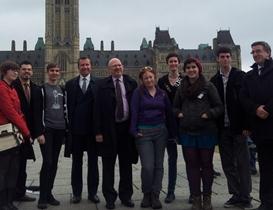
MPs Dany Morin, Craig Scott, Randall Garrison and Scott Brison with youths at the Peace Tower. Credit: Bradley Turcotte
Tuesday, May 1, may have been a dreary day, yet there were rainbows filling up the sky over Parliament Hill as Ottawa-area queer youths stormed our nation’s political hub to shadow openly gay members of Parliament.
A joint program between youth diversity initiative Jer’s Vision and New Democrat MP Dany Morin’s office, the first annual Rainbow Day on the Hill allowed six queer high school students to experience the inner workings of our political system and view the full spectrum of what it’s like to be a queer politician working on behalf of Canadians.
Morin says the idea for the program was partially inspired by a similar annual event where young women shadow female MPs for the day. Women’s Day on the Hill is considered a resounding success, as MPs Charmaine Borg and Mylene Freeman took part in Women’s Day as youths. This extraordinary development led Morin to work with Jeremy Dias, of Jer’s Vision, to make the Rainbow Day a reality.
“We need to have positive role models for LGBT kids for several reasons. It’s a period of your life when you are trying to discover who you are,” Morin says. “This is why we are doing this. To give these kids positive role models. The kids who are here today are very involved in their student lives, and they are the next leaders of tomorrow. The day is all about giving them this type of approval and saying, Go for it.”
In addition to Morin, participating MPs included Libby Davies, Randall Garrison, Craig Scott, Phillip Toone and Scott Brison. With the exception of Brison, all of the openly gay MPs represent the NDP, while Brison wears Liberal red.
The students’ day comprised a guided tour of Parliament, a visit to the Peace Tower, attendance at question period and an intimate lunch with their assigned MP.
Nepean High School student Hannah Collins, 17, shadowed Davies and cited Davies’ pragmatic approach to critical issues as the most crucial bit of counsel she received.
“I have a lot of over-exaggerated political ideology,” Collins says with a laugh. “[Davies] has big dreams, too, but she works in the details, because if she aims for those big dreams she will definitely not reach them. She gets farther if she has more realistic goals. You have to work small but have big ideas.”
Dias is someone who also strives toward big ideas. The Rainbow Day on the Hill coincided with Jer’s Vision’s seventh anniversary, as well as the 30th anniversary of the Canadian Charter of Rights and Freedoms; however, this is not the first program of its kind Jer’s Vision has attempted. When Dias’s anti-discrimination organization first explored the idea of partnering queer youth with adult role models, the proposal was met with resistance.
“One of the programs we tried to launch last year, unsuccessfully, was an adult mentorship program — a coffee night for adults in the community to meet with queer youth,” Dias explains. “We had tons of queer youth sign up for the program but no queer adults. A lot of the adults we approached thought it was not appropriate or the right thing to do. They said they didn’t feel comfortable hanging around a bunch of kids. It’s amazing how our own prejudice can hit us and we can be victims to our own stereotypes.”
Dias went on to say that it is important for queer adults to overcome their own misconceptions of interacting with youths and to remember how they felt as gay or lesbian teenagers.
“As adults we need to not forget high school. We have to remember what it’s all about, and in that vein I think we need to be courageous. When you’re living in a school of one thousand people and you’re one of the only out kids and the only gay role models you see are the stereotypes on Glee, you sort of feel alone,” Dias says. “Your parents are straight, your family is straight and your extended community is straight. Being in school can be very insular. You might live downtown and be able to go to the gay discretion group once a week. You might be lucky enough to have access to internet chat, but for the most part the idea of interacting with queer people is sort of foreign.”
Morin made sure the goal of the Rainbow Day on the Hill wouldn’t remain a foreign idea to straight members of Parliament. In a statement in the House of Commons, he spoke of his hopes for the future of queer Canadian teens.
“These students are leaders of their communities. Some of their lives have been touched and shaped by the scourges of both homophobia and bullying. Despite this, and maybe because of it, they have the inner strength to stand up for what they believe in. I look forward to the day when one of them joins me as an MP here on the Hill,” he said. “LGBT individuals represent Canadians at all levels of government. With our allies, we fought for marriage between same-sex individuals and for the inclusion of sexual orientation in the Criminal Code. Although there remain more battles to fight, days like today are important reminders that we can and we will make things better.”


 Why you can trust Xtra
Why you can trust Xtra


